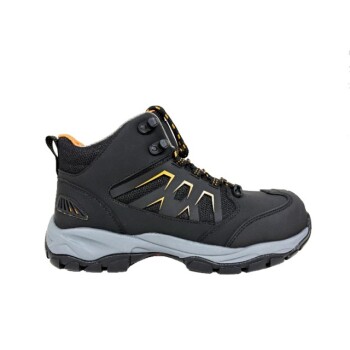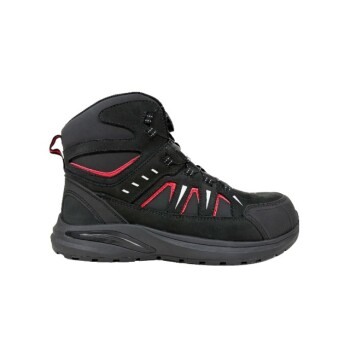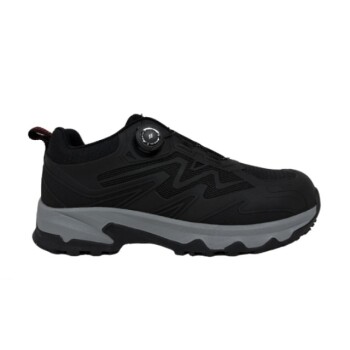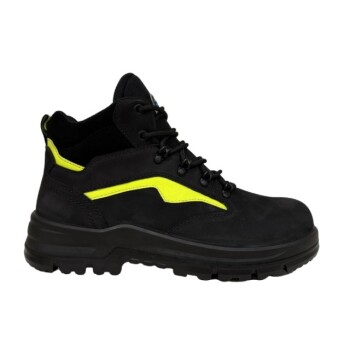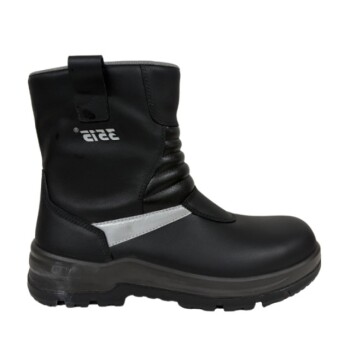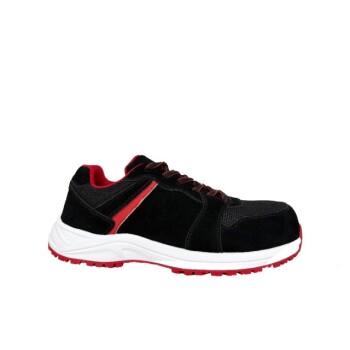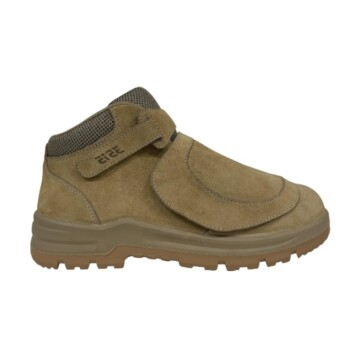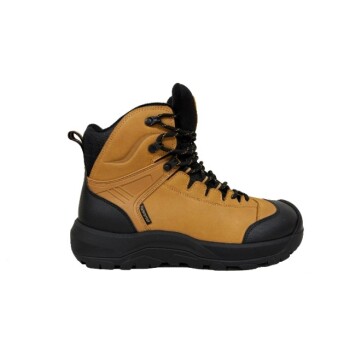At its core, a safety shoe is an engineered system of specialized materials working in concert. The most common materials are steel or composites for the protective toe cap, leather or synthetic textiles for the upper body, and rubber or polyurethane for the outsole, each selected for a specific protective or functional purpose.
The key takeaway is that no single material defines a safety shoe. Instead, its performance and suitability for a specific work environment are determined by the strategic combination of materials used in its three critical zones: the protective toe, the durable upper, and the high-traction outsole.
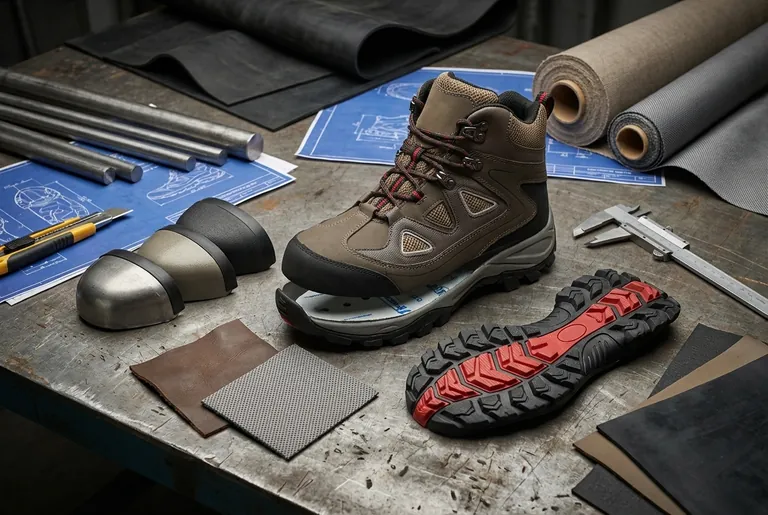
Deconstructing the Safety Shoe: A Material-by-Material Guide
A safety shoe is far more than its steel toe. Understanding the role of each material in each component is essential for appreciating how it protects you.
The Protective Core: Toe Cap Materials
The toe cap is the shoe's primary defense against impact and compression injuries.
- Steel: The traditional standard, steel offers maximum protection against heavy falling objects and compression. It is cost-effective and highly durable.
- Composite Materials: Made from non-metal materials like Kevlar, carbon fiber, or plastic, composite toes are significantly lighter than steel. They do not conduct heat, cold, or electricity, making them ideal for extreme temperatures and electrical hazard environments.
- Aluminum: Aluminum toes provide reliable protection and are lighter than steel. Like steel, however, they will conduct temperature and electricity.
The Outer Shell: Upper Materials
The upper part of the shoe shields the foot from splashes, sparks, and abrasions while providing structural support and comfort.
- Leather: Full-grain, nubuck, or suede leather is a popular choice for its exceptional durability, breathability, and comfort. It naturally molds to the foot over time but may require maintenance.
- Synthetic & Textile Materials: Materials like synthetic leather or advanced textiles (like mesh) are often used to enhance specific properties. They can offer superior waterproofing, chemical resistance, or enhanced breathability and are typically lighter than traditional leather.
The Ground Connection: Outsole Materials
The outsole is your interface with the work surface, responsible for grip, stability, and protection from ground-level hazards.
- Rubber: Highly valued for its superior resistance to abrasion, heat, oil, and chemicals. Rubber outsoles provide excellent grip and are extremely durable, making them common in heavy industrial settings.
- Polyurethane (PU): PU is a lighter and more flexible material that provides excellent shock absorption and cushioning. While less resistant to extreme heat than rubber, its comfort makes it ideal for long hours on hard surfaces like concrete.
- Thermoplastic Polyurethane (TPU): TPU is a modern hybrid material that combines the durability and resistance of rubber with the lightweight flexibility of PU. It offers a great all-around balance of performance.
The Hidden Protectors: Midsoles and Linings
Beneath the surface, other materials provide crucial support and safety.
- Midsoles: Often made of puncture-resistant materials like steel plates or woven fabrics like Kevlar, the midsole protects the foot from sharp objects penetrating from below.
- Linings: Inner linings made from breathable, moisture-wicking textiles (like cotton or specialized composites) are critical for keeping the foot dry, comfortable, and healthy throughout the workday.
Understanding the Trade-offs: Protection vs. Comfort
Selecting the right safety shoe involves balancing competing priorities. The material choices you make directly reflect these trade-offs.
Steel vs. Composite Toes
The most common decision point is the toe cap. A steel toe offers maximum strength but is heavier and will set off metal detectors. A composite toe is lighter, won't conduct electricity or temperature, but can be slightly bulkier to achieve the same safety rating.
Leather vs. Synthetic Uppers
Leather is the benchmark for rugged durability and breathability, but it can be heavy and susceptible to certain chemicals. Synthetic uppers can be engineered for specific tasks like waterproofing or chemical resistance and are often lighter, though they may offer less breathability than high-quality leather.
Rubber vs. Polyurethane (PU) Outsoles
This choice directly impacts both safety and comfort. A rubber outsole provides the best defense against heat and harsh chemicals but is typically heavier and less flexible. A PU outsole offers superior shock absorption and is much lighter, reducing fatigue, but provides less resistance to extreme heat and abrasion.
Making the Right Choice for Your Environment
Your specific job function and work environment should dictate the ideal material composition of your footwear.
- If your primary focus is heavy industry or construction: Opt for a shoe with a steel toe, a durable leather upper, and a robust rubber outsole for maximum protection and longevity.
- If your primary focus is logistics, warehousing, or light manufacturing: A composite toe with a textile or synthetic upper and a lightweight PU outsole will provide necessary protection while maximizing comfort and reducing fatigue.
- If your primary focus is working with electrical hazards or in extreme temperatures: A non-metallic composite toe is essential, paired with an upper and outsole rated specifically for your environmental risks.
Ultimately, choosing the right safety shoe is about matching the material's inherent properties to the specific hazards you face every day.
Summary Table:
| Component | Common Materials | Key Properties |
|---|---|---|
| Toe Cap | Steel, Composite (Kevlar, Carbon Fiber), Aluminum | Impact/compression resistance, lightweight, non-conductive (composite) |
| Upper | Leather, Synthetic Textiles | Durability, breathability, chemical/water resistance |
| Outsole | Rubber, Polyurethane (PU), Thermoplastic Polyurethane (TPU) | Slip resistance, abrasion/chemical resistance, cushioning |
| Midsole/Lining | Steel, Kevlar, Moisture-Wicking Textiles | Puncture resistance, foot comfort, dryness |
Need High-Quality Safety Footwear Tailored to Your Industry?
As a large-scale manufacturer, 3515 produces a comprehensive range of safety shoes and boots for distributors, brand owners, and bulk clients. Our production capabilities encompass all types of protective footwear, ensuring the perfect material combination for any work environment—from heavy industry to warehousing.
Contact our experts today to discuss your specific needs and discover how we can deliver durable, compliant, and comfortable safety footwear for your business.
Visual Guide
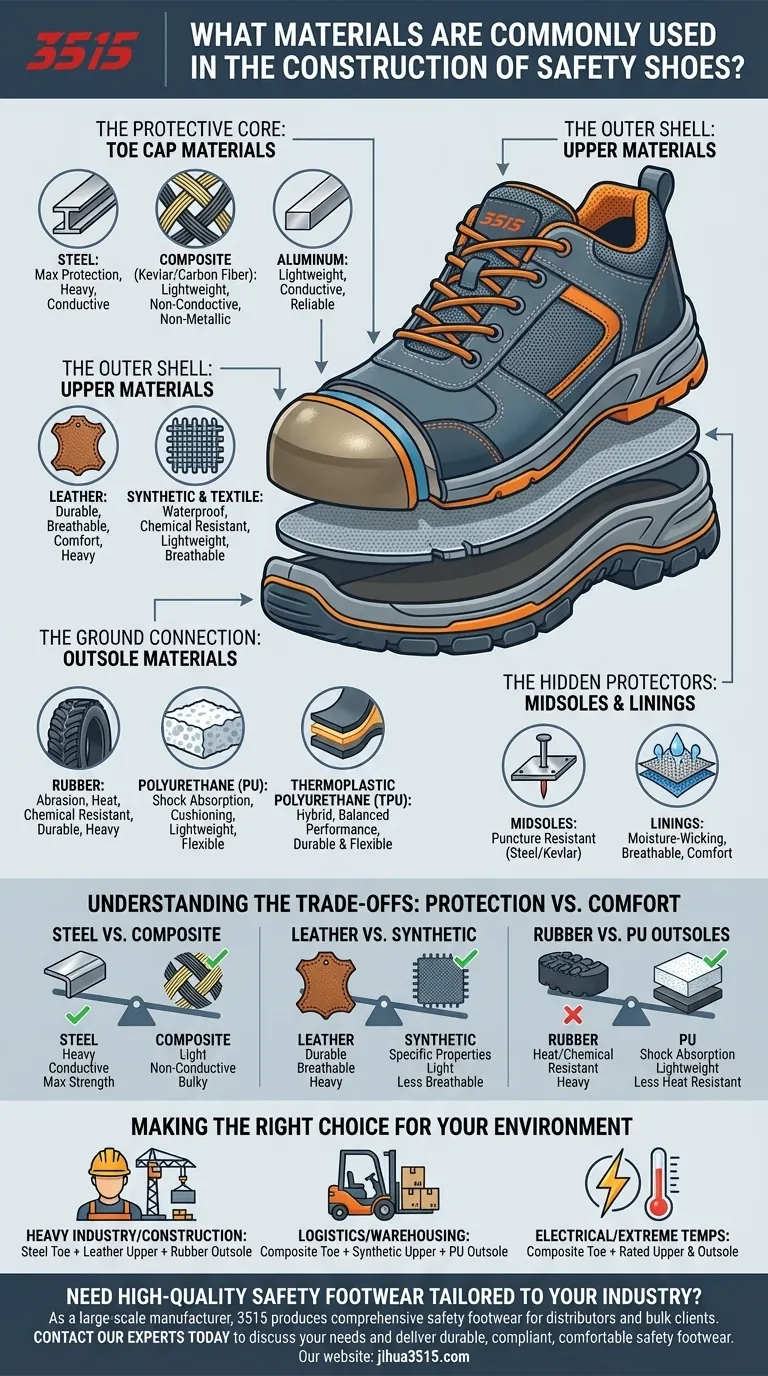
Related Products
- Safety Footwear Wholesale Manufacturer for Custom OEM/ODM Production
- Premium Flame-Retardant Waterproof Safety Boots and Shoes
- Premium Sport Style Safety Boots for Bulk Orders
- Heavy Duty Nubuck Safety Boots Safety Shoes for Global Distribution
- Advanced KPU Athletic Safety Shoe with Steel Toe Cap Anti-Slip Rotary Lacing System
People Also Ask
- What cultural and environmental considerations are tied to wearing shoes indoors? Balance Hygiene, Tradition, and Foot Health
- What materials are used for safety toes? Choose Steel, Composite, or Aluminum for Your Work Boots
- Is it normal to wear shoes in the house? A Guide to Hygiene, Comfort & Culture
- What are the cultural perspectives on wearing shoes in the house? A Guide to Home Etiquette & Hygiene
- Can heavy duty work boots be worn daily outside of work? Discover Durable, All-Day Comfort


